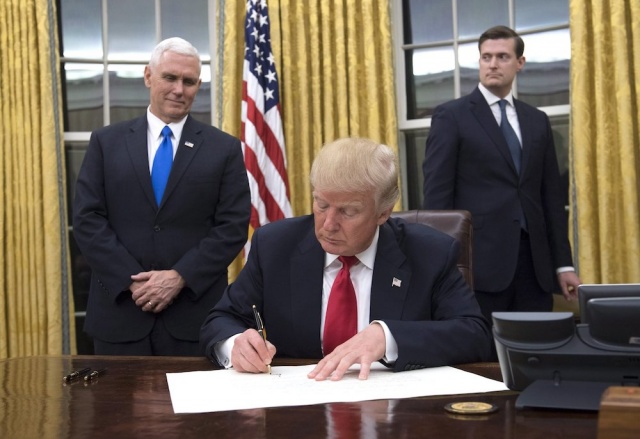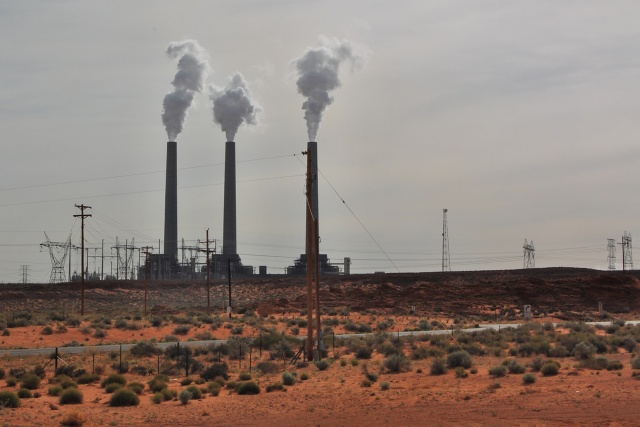Trump and Science – a press review of scientific and popular science papers
To protest against the measures of the Trump administration questioning scientific results, American scientists will march in the streets on 22 April, Earth Day. Sympathy demonstrations will be held in approximately a hundred other countries. This press review is based on articles published in Science, Nature, Scientific American, New Scientist and National Geographic in January and February 2017.
23 February, 2017
The American press has been flooded with reactions in which serious concerns about the fate and independence of science have been voiced. Leading papers are playing their part in the protests: several articles assessing Trump’s previous steps and considering his future moves have been published in Science, Scientific American and National Geographic. On this side of the ocean, British magazines Nature and New Scientists are closely following events connected to Trump’s actions that might determine the future of science. The voices of authoritative scientific and popular science papers are presented here.
Trump and climate change
“The Trump administration was merely minutes old when all references to climate change disappeared from the White House website,” said Laura Parker, a journalist for National Geographic, recalling the stormy introduction of the new administration. She also outlines the beginnings of a rebellion in government agencies responsible for science “that quickly transformed from a duel about presidential popularity into the fate of the government’s work on climate change.”
It comes as no surprise that Trump’s skepticism about climate change is in the focus of concern. The new president has openly good connections with prominent representatives of the fossil fuel industry, including heads of oil and gas companies. His infamous tweet posted in 2012 was cited, among other sources, by New Scientist: “The concept of global warming was created by and for the Chinese in order to make U.S. manufacturing non-competitive.”
Other members of the Trump administration are also climate skeptics. The former Governor of Georgia, Sonny Perdue, nominated for U.S. Secretary of Agriculture, remarked as follows in an essay in 2014: “Climate change, we’re told, is responsible for heavy rains and drought alike. Whether temperatures are unseasonably low or high, global warming is the culprit. Snowstorms, hurricanes, and tornadoes have been around since the beginning of time, but now they want us to accept that all of it is the result of climate change.”
 Donald Trump Source: MTI/EPA
Donald Trump Source: MTI/EPANational Geographic confirmed that communications officials at each and every federal agency were directed to limit communications, at least temporarily. The paper, based on information from Reuters, also claimed that the main US agency concerned with environmental protection, the Environmental Protection Agency (EPA), was directed to remove its homepage on climate change, although this directive was later withdrawn owing to general outcry.
According to each authoritative source, including Nature, the would-be leader of the EPA is open climate change skeptic Scott Pruitt, former Oklahoma Attorney General, who has mounted a legal challenge to the limits placed on greenhouse gas emissions from power plants. The EPA’s grants and contracts have been frozen, although this government order may soon be rescinded according to some reports. Hydrologist Peter Gleick, co-founder of the Pacific Institute, California, told National Geographic: “Taken together, what we’ve seen over the first five days is completely unprecedented. I have seen nothing like it in my lifetime and I’ve been around for a while.”
Parker admits that the Trump administration is not the first government which have attempted to influence scientific research by contradicting party policies. “Under President George W. Bush, Interior Department officials sometimes overruled agency scientists working on endangered species issues. The Obama administration was accused by scientists of underreporting damage from the 2010 BP oil spill in the Gulf of Mexico and at times required public-relations chaperones when scientists talked to the press,” However, she goes on to say that the speed and ferocity with which the Trump administration tried to seize the reins of science in its first days in office is unprecedented.
 The Navajo Generating Station, a coal fired power plant in the state of Arizona Source: Flickr/Ilya Katsnelson
The Navajo Generating Station, a coal fired power plant in the state of Arizona Source: Flickr/Ilya KatsnelsonScientists to march in protest on Earth Day
“Scientists are not known for waging political protest en masse,” National Geographic adds. “But they have become so alarmed by what has played out, they are taking a page from the Women’s March in Washington that drew an estimated 470,000 protesters, the day after Trump was sworn into office.” “March for Science” will take place in Washington, D.C. on 22 April, coinciding with Earth Day. The initiative had 328 followers on Twitter as of 19 February.
Organizers told The Washington Post that more than 40,000 people have signed up online to volunteer to organise tasks, and at least 100 sites in 11 countries have announced sympathy demonstrations. As part of this project, in answer to the initiative to muzzle science, scholars will deliver lectures on their scientific results in tents.
However, a march is not the only way to defy the administration in America, as its states are relatively independent. The research pursued at federal agencies might be transferred to state level – a possible solution outlined by New Scientist. In case the operation of satellites indispensable to climate change research were to be threatened, Jerry Brown, Governor of California, has a solution he explained to the American Geophysical Union, AGU: “If Trump turns off the satellites, California will launch its own damn satellite.”
Trump and anti-vaccination
Besides his climate skepticism, it is Trump’s sympathy with the anti-vaccination movement which is a hot topic in the international press. An editorial in Nature warns that Trump’s suggestion to put together a commission to study vaccine safety is “biased and dangerous.” “Trump’s embrace of the tiresome and discredited anti-vaccination movement is no secret. He has tweeted and publicly discussed his concerns that childhood vaccines may be linked to autism. He has previously met with like-minded activists, including Andrew Wakefield, father of the ‘anti-vaxxer’ crusade, who has been barred from practising medicine in the United Kingdom for professional misconduct,” according to the editors.
 Source: stockfresh.com
Source: stockfresh.comAlthough explicitly denied by Trump’s staff, several sources including Nature claim that the president is to appoint Robert F. Kennedy, Jr. as head of the commission responsible for overseeing the safety of vaccinations and research on vaccines. Nature states that “[Kennedy] has in the past argued – unconvincingly – that a preservative in some childhood vaccines is linked to autism spectrum disorder, despite abundant evidence to the contrary.”
“A 2015 study of more than 95,000 children found no association between the measles, mumps and rubella vaccine and an increased risk of autism – even among children with a family history of the disorder,” write the editors of Nature. “All the evidence shows that it is actually misconceptions about vaccines – such as those promoted by Trump – that cause serious harm. The United States has already experienced a series of outbreaks of preventable diseases. In 2014, measles affected 667 people in the country, primarily those who were unvaccinated.”
Authors warn that scholars, doctors and commentators should not wait until the Kennedy Commission is set up officially and starts to work. That might be too late. “There is no cause to be surprised if it shows little regard for science – or even if it targets scientists who speak out in favour of vaccination. Those who claim a link between vaccines and autism can do so only by discrediting the scientific evidence and, often, the scientists who gathered it. Kennedy’s reference to investigating vaccine safety “and scientific integrity” provides ample warning of what is to come. Scientists should get their retaliation in first. Lives are at stake,” concludes Nature.
Scientific American dedicated a full online column to Trump and science. A short list of some of the leading headlines is enough to reflect the general mood of the authors: Anxiety Mounts at National Labs Over Future of Climate Research – Researchers say they will resist any attempts to meddle with their work or their findings; Meet the Scientists Hit by Trump’s Immigration Ban – Order barring citizens of seven countries from entering the U.S. has left many confused and afraid; “Rogue” Science Agencies Defy Trump Administration on Twitter – Anonymous accounts are purportedly linked to NASA, National Parks and other agencies; Trump's Wall Could Cause Serious Environmental Damage – The effects of building a massive concrete wall range from increased emissions to blocked wildlife migration routes; The War on Facts Is a War on Democracy – In a time when facts don’t matter, and science is being muzzled, American democracy is the real victim.
Ten points of Science
Meanwhile, the authoritative Science magazine is sober and pragmatic compared to the ferocity of other papers. On Trump’s inauguration, they published a list of ten questions crucial for science, concerning, especially, financial and organisational issues:
Will Trump influence the 2017 budget? How will R&D fare in Trump’s first budget? Who will advise Trump on science? Who will run the science agencies? Will science be part of an infrastructure plan? How many of Obama’s science initiatives will survive? Whither space exploration? Will the United States remain part of ITER (a seven-strong partnership building a fusional reactor, which, according to the article, is a testbed for what could someday be a hugely important source of power, but is comically overbudget)? Will statistical agencies be targets? And finally: How far will the regulatory rollback go (for federal agencies concerned with environmental protection)?
The list of questions appeared on 23 January in Science. Few details have been revealed about what forces are at work deep under the loud surface. The editor of the list, Jeffrey Mervis, predicts that final policies will unfold in the course of elaborate background negotiations and committee tugs of war. He remarks that Congress has the final say over the budget, and no president has been able to have everything he wanted passed. To erase any of the climate, environmental and health rules of the Obama-era could take years, and is probably impossible without winning in court.
The first weeks have certainly been rather turbulent. Scientists are either holding their breath or rebelling loudly as they watch presidential rhetoric oppose the scientific results of several decades of scientific work.
